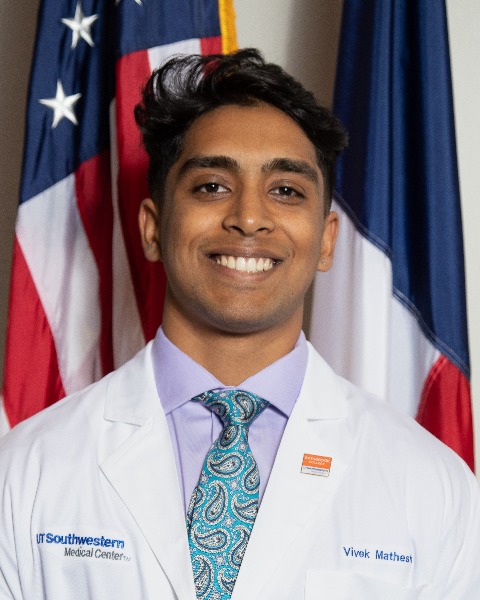Mental Health
Mental Health 1
582 - Mental Health Matters: Evaluation of an educational program to address mental health needs of adolescents in the DFW area
Friday, April 28, 2023
5:15 PM - 7:15 PM ET
Poster Number: 582
Publication Number: 582.126
Publication Number: 582.126
Vivek Mathesh, University of Texas Southwestern Medical School, Plano, TX, United States; Robin Granberry, University of Texas Southwestern Medical School, Dallas, TX, United States; Lauren Ford, University of Texas Southwestern Medical School, Dallas, TX, United States; Wesley Thompson, University of Texas Southwestern Medical School, Dallas, TX, United States; Hilda Loria, University of Texas Southwestern Medical School, Dallas, TX, United States

Vivek Mathesh, BSA (he/him/his)
Medical Student
University of Texas Southwestern Medical School
Plano, Texas, United States
Presenting Author(s)
Background: In the United States, 48% of children are impacted by at least one key adverse childhood experience (ACE), such as abuse, neglect, violence, and/or racism. ACEs predispose children to Post-Traumatic Stress Disorder, depression, anxiety, and other mental health illnesses. For children in low-income families with increased exposures to ACEs, access to mental health care is limited. To improve the mental health of underserved youth and attenuate psychiatric manifestations later in life, early intervention is crucial.
Objective: The primary aim of this study is to describe preliminary findings regarding the efficacy of MHM’s mental health curriculum in improving mental health awareness among Dallas underserved youth.
Design/Methods: A needs assessment conducted by Mental Health Matters (MHM) identified specific mental health topics that community organizations felt important for the Dallas youth they serve. These included processing trauma, emotional self-regulation, and how to seek help. The results of this needs assessment informed the development of a longitudinal mental health curriculum for high school students in an underserved Dallas community. Pre-and post subjective surveys and multiple choice questions were administered at each session to assess students’ knowledge and understanding of lesson objectives.
Results: Preliminary data from 4 lessons with high school students reported an average increase of confidence of: 66% over the fundamentals of mental health (i.e., stigma, mental health, emotions); 50% over the stress response, box breathing, and perceiving stress; 33% over coping skills and how to get help; 40% over communication styles and conflict resolution strategies. Additional qualitative feedback from students include: "[I learned] to be able to handle stress or to reach out when feeling suicidal" and “I learned what mental health means.”
Conclusion(s): There is a great need in the Dallas area for mental health resources for underserved youth. A mental health curriculum developed based on a community needs assessment shows promise as a potential educational program to increase mental health awareness among underserved youth in Dallas. Careful consideration must be taken consistently to implement the program longitudinally in underserved areas. Next steps include: incorporating feedback to improve the curriculum content, obtaining longitudinal data to observe trends of students’ confidence regarding mental health topics, and partnering with local community leaders and school districts to provide accessible, high quality mental health programming for underserved youth in our community.
.png)
.png)
